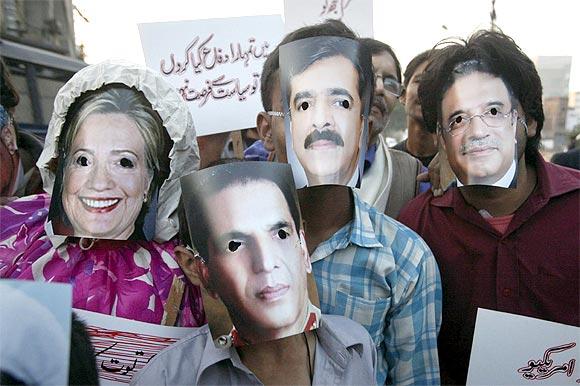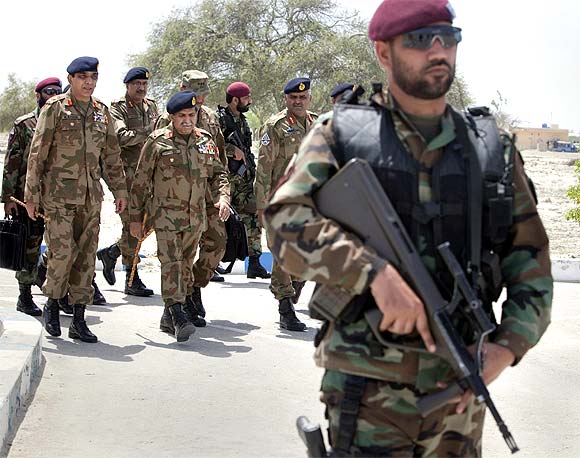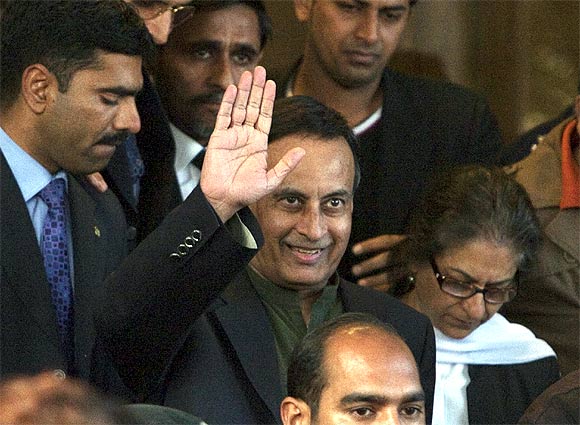
The Pakistan Army chief will not like to place himself in a position where he has to overthrow the elected head of state and the supreme commander of the armed forces, says B Raman in this FAQ
What is the likelihood of Pakistan's Chief of the Army Staff General Ashfaq Pervez Kayani staging a coup, seizing political power and imposing the rule of the army till fresh elections are held?
Not very likely. The present tussle of the Pakistan Army over the so-called memogate scandal is against Asif Ali Zardari, who is the elected head of state and supreme commander of the armed forces. The army has no grievance against Yusuf Raza Gilani, the elected head of government. If General Kayani wants to seize power, he has to overthrow the head of state who is the supreme commander of the armed forces.
Acting against the supreme commander of the armed forces would be an act of treason. In the history of Pakistan, there has been only one coup against the head of state -- by General Ayub Khan, the then COAS, against the then President Iskander Mirza.
Click on NEXT for more...

On October 7,1958, Mirza suspended the Constitution on the ground that it was proving to be unworkable, imposed martial law and appointed Ayub Khan as the martial law administrator.
Ayub Khan, who did not get along well with Mirza, forced him to go into exile in London and declared himself the president of Pakistan and supreme commander of the armed forces. The coups of Zia ul-Haq in 1977 and of General Pervez Musharraf in 1999 were against the elected head of government who was not the supreme commander of the armed forces.
Zia and Musharraf had no difficulty in getting their coup validated ex-post facto either by a compliant President or judiciary or both under the so-called doctrine of necessity.
General Kayani will not like to place himself in a position where he has to overthrow the elected head of state of Pakistan and the constitutionally designated supreme commander of the armed forces. Iftikhar Mohammad Chaudhury, the chief justice of the Pakistan Supreme Court, has made it clear on many occasions that there is no question of the judiciary validating a coup ex-post facto under the doctrine of necessity.
If Kayani stages a coup against Zardari and fails to get it validated by the judiciary, he would have committed an act of treason on two counts -- for overthrowing his head of state and for acting against his supreme commander.
All the other senior officers, who go along with a possible coup plot by Kayani, would be liable to be tried for conspiring and acting against their Supreme Commander. Many of them may not want to find themselves in such a situation.
Click on NEXT for more...

Does that totally rule out the possibility of an anti-Zardari coup?
Not necessarily. If there is a serious law and order situation in Pakistan, the army under Kayani may still stage a coup unmindful of the legal consequences. One does not presently see the possibility of such a situation arising.
If an outright coup is ruled out, what is the fall-back position available to Kayani to save his face?
The fall-back option available to the army is to manipulate the situation in such a manner so as to make it untenable for Zardari to continue as the head of state and the supreme commander of the armed forces. The army could achieve this by driving a wedge between Zardari and Gilani or by undermining Zardari's political base in the Pakistan People's Party. Such a contingency is unlikely. Both Gilani and the PPP have remained steadfast in their loyalty to Zardari so far.
A second option available to the army is by having the COAS declared as the supreme commander of the armed forces. This would make it easier for Kayani to act against Zardari. In May last year, after the USA's raid in Abbottabad to hunt for Osama bin Laden, a person filed a petition before the Lahore high court to have the COAS declared as the supreme commander of the armed forces.
Such a change could be brought in only by a Constitutional amendment. With the PPP and its allies having the majority in the national assembly and in the provincial assemblies of Sindh and Khyber-Pakhtoonkwa, such an amendment is unlikely.
Click on NEXT for more...

The other option available to the army is to work and hope for an adverse ruling by the Supreme Court against Zardari in the memogate case. The possibility of the Supreme Court giving a direct finding against Zardari is weak now. Even Manzoor Ijaz blames only Hussain Haqqani, former Pakistani ambassador to the United States, for the contents of the memo seeking US assistance to prevent a coup after the Abbottabad raid. He has not definitively blamed Zardari for the contents of the memo.
The best the army can hope for from the Supreme Court is for an adverse ruling against Haqqani holding him guilty of an act of treason for having sought the assistance of a foreign government for acting against the Pakistan Army. If the court gives such a ruling, Zardari could become an accomplice of Haqqani's act of treason by virtue of sheltering him initially in his house and subsequently in Gilani's house after the former envoy returned from Washington DC to resign.
Even in such an eventuality, the Supreme Court cannot act against Zardari unless the National Assembly in which the PPP and its allies have a majority lifts Zardari's immunity against prosecution.
Is there any political and honourable way out available?
The only honourable way out is by dissolving the National Assembly before its term expires in March next year and calling for fresh elections later this year. However, if the PPP and Zardari return to power in that election, it will pose an embarrassing situation for Kayani as well as the chief justice.
Pakistan is in for a long period of an excruciating war of nerves in which there will be neither honour nor victory for any of the dramatis personae.